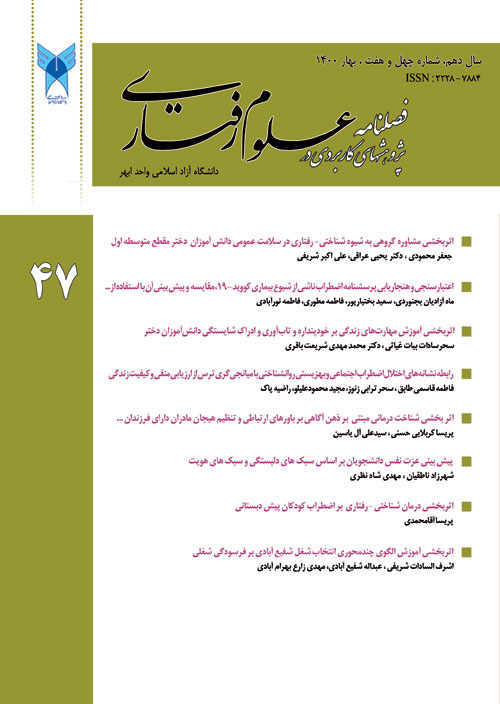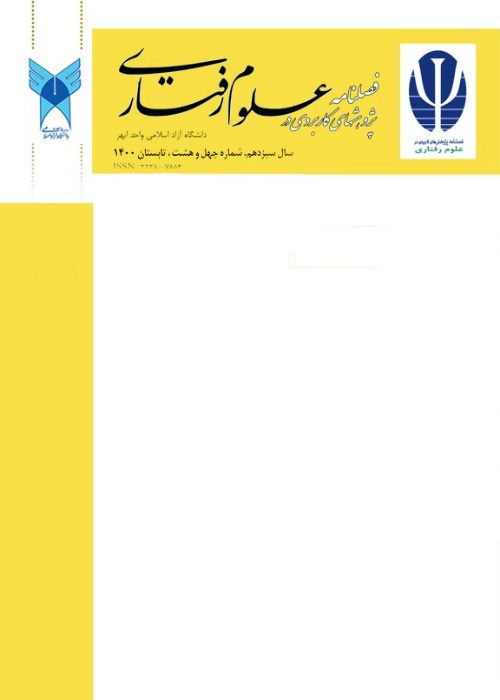فهرست مطالب

نشریه پژوهش های کاربردی در علوم رفتاری
پیاپی 48 (تابستان 1400)
- تاریخ انتشار: 1401/05/06
- تعداد عناوین: 5
-
Pages 11-33
The aim of this study was to compare the effectiveness of structural family therapy group training with cognitive-behavioral approach on reducing marital conflict between cultural couples in Parsabad city. The present study was a quasi-experimental pretest-posttest with a control group. The statistical population included the cultural couples of Parsabad city, whose number was couples based on the statistics obtained from the education of the city. couples were randomly selected as statistical sample members by Krejcie and Morgan table. Then the marital conflict questionnaire was distributed among the members of the statistical sample and couples ( people) who had the highest conflicts were selected and randomly divided into three groups of couples ( experimental groups and control group) to teach structural and cognitive behavioral approaches. they got. Data obtained from the study were analyzed by multivariate analysis of covariance (MANOVA) tests. The results showed that structural family therapy is effective in reducing marital conflict. Cognitive-behavioral therapy is also effective in reducing marital conflict. There is a difference between the effectiveness of group training in structural and cognitive-behavioral family therapy in reducing marital conflicts, and the structural family therapy approach has a greater impact than cognitivebehavioral therapy. Therefore, in counseling centers, these treatment approaches can be used to improve marital life and reduce conflicts between couples.
Keywords: Marital Conflicts, Structural Family Therapy, Cognitive-Behaviora -
Pages 35-60
The aim of this study was to investigate the role of academic anxiety in the relationship between psychological control of parents and academic wellbeing. The statistical population included all high school students in Ahvaz in the academic year , from which people were selected by multi-stage cluster random sampling. And answered the questionnaires of parental psychological control, achievement anxiety and academic well-being. Data were analyzed using structural equation modeling and multiple regression by Amos software. Cronbach's alpha method was used to determine the reliability of the instrument. The results showed that the indirect effect of parental psychological control on academic well-being through academic anxiety is significant. (P and β = - ). Academic anxiety also mediates the relationship between psychological control and academic well-being, but does not moderate this relationship.
Keywords: Academic Anxiety, Academic Welfare, Parental PsychologicalControl, Modified Mediation Model -
Pages 61-84
Present research aimed to predict marital quality based on differentiation of self and frustration tolerance with in employed women in nursing. Method was descriptive- correlation. Population were employed married women in nursing of Farhikhtegan hospital of Islamic Azad University in . participants were selected by simple random sampling and completed revised Dyadic Adjustment Scale (RDAS) of Busby & et al ( ), Differentiation of Self Inventory (DSI) of Skowron & Friedlander ( ) and Harrington, s ( ) Failure Tolerance questionnaire. data were analyzed by Pearson’s correlation and multiple regression and SPSS- . the results indicated that the dimensions of differentiation of self (I position, emotional reactivity, emotional cutoff, fusion with others) positively and significantly and frustration tolerance (emotional intolerance, discomfort intolerance, achievement, entitlement) negatively and significantly predict marital quality of employed women in nursing (P< ). the results showed evidence that differentiation of self and frustration tolerance partially predict marital quality of employed women in nursing. therefore, in order to promote marital quality of women, need to pay attention their differentiation of self and frustration tolerance and is suggested psycho educational interventions was used for moderating and efficiency differentiation of self and frustration.
Keywords: Marital quality, Differentiation of self, Frustrationtolerance, Nursing -
Pages 85-100
The aim of this study was to determine the effect of coping strategies training on students' academic burnout. The study population consisted of all female high school students in Takestan in the academic year of - , of which were selected by purposive sampling and randomly assigned to experimental and control groups, and coping strategies. The training group was trained in sessions. The instruments used in this study were the Maslach burnout questionnaire. The present study was a quasi-experimental study with a pretestposttest design with a control group. Results showed that training coping strategies reduced academic burnout in the experimental group compared to the control group (p < ). The results of the study indicate the importance of the effect of coping strategies training and the use of coping strategies has been able to explain the high rate of changes in students' academic burnout.
Keywords: Academic burnout, coping strategies -
Pages 101-123
This study aimed to determine the effectiveness of t emotion regulation strategies training on depression and anxiety symptoms in adolescents as active users of social networks. In this quasi-experimental study with pretest - posttest was used. The study population consisted of adolescents living in the city of Karaj was active users of online social networks. In this community, available for a sample of adolescents aged to years of one of the boys' high school in Karaj were selected. Subjects completed researcher made questionnaire that during the day a few hours to spend in the virtual network, and filled out questionnaires for depression and anxiety. Then, a training program for weeks, the experimental group was implemented .According to analysis carried out, a significant difference in the symptoms of depression and anxiety in experimental and control groups, respectively. The results showed that training in emotion regulation strategy, depression and anxiety in adolescents reduces active users of online social networks (P < ). Taken together, the findings suggest that symptoms of depression and anxiety in adolescents as active users of social networks can be reduced by training in emotion regulation strategies.
Keywords: emotion regulation strategies, depression, anxiety, adolescents asactive users of social networks


